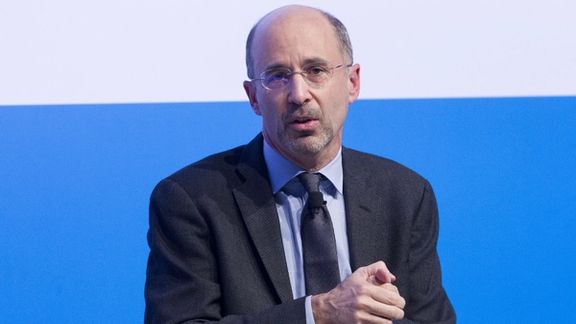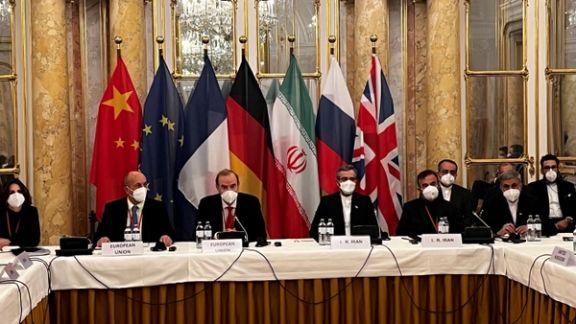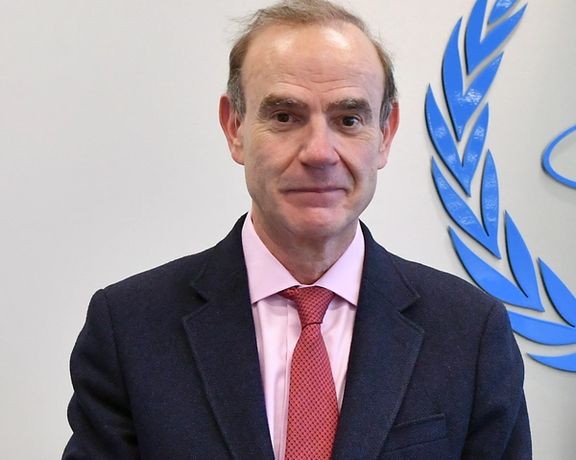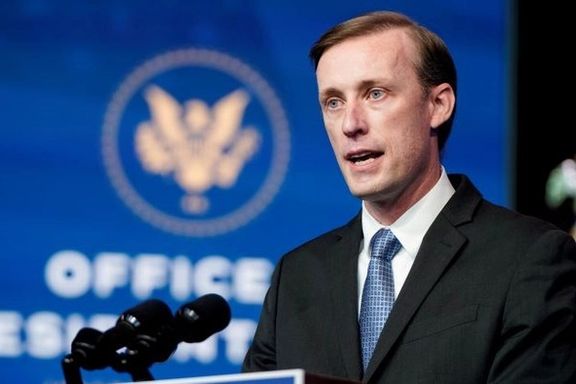US Envoy To Return To Vienna Over Weekend For Iran Talks

US Special Envoy for Iran Rob Malley plans to travel to Vienna over the weekend for fresh talks on reviving Iran's 2015 nuclear deal with major powers.

US Special Envoy for Iran Rob Malley plans to travel to Vienna over the weekend for fresh talks on reviving Iran's 2015 nuclear deal with major powers.
The talks seek to find a way for the United States and Iran to resume compliance with the agreement.
Then-President Donald Trump pulled the United States out of the deal in 2018 and reimposed U.S. sanctions, prompting Iran to start violating the nuclear restrictions about a year later. Iran struck the original deal with six major powers: Britain, China, France, Germany, Russia and the United States.
Enrique Mora, the senior European Union official chairing the talks, said on Twitter that they would resume on Thursday.
The talks have effectively been indirect negotiations between Iran and the United States, with diplomats from other nations shuttling between them because Tehran has refused face-to-face meetings with US officials.
Noting the EU statement that talks resume on Thursday, the State Department spokesman told reporters: "We understand that there will be a day of meetings before the heads of delegations need to attend...so Special Envoy Malley and his inter-agency delegation will plan to join the talks over the weekend."
Report by Reuters

Two former Iranian diplomats speaking to local media have urged the government to show flexibility in nuclear talks, to help remove United States sanctions.
Mostafa Alaei, a former senior Iranian diplomat, says reviving the 2015 nuclear deal will not solve all of Iran's problems with the West, while the failure of the previous round of talks between Iran and world powers has left a dramatic impact on Iran's ailing economy.
Alaei who was speaking to Etemad newspaper in Tehran on Wednesday said that "Iran's case is no longer a simple political or economic issue, it is a case impacting international security."
Iran should show flexibility
The former diplomat suggested that if the West offers concessions in the next round of talks in Vienna, Iran should show flexibility. "International negotiations are about give and take," he pointed out.
Alaei, who served in various positions at the Iranian Foreign Ministry and was a member of the Iranian delegation to the United Nations and Iran's ambassador to Venezuela, believes that "although the JCPOA [Joint Comprehensive Plan of Action] was an agreement made under pressure, it is still a brilliant document in Iran's political history."
He said Iran should have not allowed Iran-o-phobia to spread all over the world. Suggesting that what Iran needs at this point is a change to its approach in foreign policy, Alaei said, "It is wrong to think that we should always live under pressure. Sometimes we need to sacrifice the government's prestige to save national interests."
He further stressed: "We should come to know the true threats in our foreign policy, not the imaginary threats that are the products of illusion."
Next round of talks “fragile”
Meanwhile, another seasoned diplomat Fereidoun Majlesi said in an interview with Iran Diplomacy website, close to the Foreign Ministry, that the next round of talks starting in Vienna on Thursday is the most fragile round of the nuclear negotiations. However, Majlesi added that it is unlikely the talks would come to a halt.
"One cannot say with certainty that the next round of talks is going to fail like the previous round, but it is undoubtedly going to be the most fragile round of the nuclear talks because the Raisi administration is insisting on its suggested package which has already been ruled out by both Europeans and Americans," he reiterated.
We cannot deny the impact of sanctions
President Raisi and his administration deny the impact of a deadlock on the economy and their reaction to the falling value of the Iranian currency has been an unjustifiable punishment for businesses and the people. Majlesi said, "the government is denying the realities although it is well aware of the situation in the country. The outcome of this denial is that we should wait for another shock to the markets as a result of a possible failure of the next round of talks."
Majlesi stressed that "Like many other countries, Iran's economy is dependent on the US dollar. This has nothing to do with who is in power in Iran. The economy has been dependent on the rate of exchange for US dollar since the 1979 revolution and even before that. So, you cannot deny the impact of sanctions. Rising prices are not manipulated by domestic and foreign enemies as Iranian politicians say. You cannot justify it with the illusion of a conspiracy. This is a reality that leaves its impact on the people's livelihood."
Majlesi further warned that denying the problem will not serve Raisi's interests as the gap between his administration and the people will further widen because of this denial.
Counting on Russia
Speaking about upcoming talks, Majlesi said: "Iranian negotiators' new suggestions that undermined the outcomes of negotiations [Nov. 29-Dec. 3] have practically put an end to dialogue. The next round of the talks is going to start in a non-constructive and negative atmosphere.
Majlesi warned that "Iran is not powerful enough to change the rhetoric and agenda of the negotiations. He pointed out that Iran is counting on Russia's role as a mediator. But the strong coherence among Western negotiators will force Russia and China to follow the westerners' lead. This raises the likelihood of the collapse of the next round of talks.
"On the other hand, like all other countries, Russia's main concern is to serve its own interests and Iran's reliance on Moscow will increase Russia's influence and power in Vienna so that it might want to take advantage of the Iran card in front of US and European sides particularly given the developments in Ukraine.

Russia’s envoy in Vienna has tweeted Wednesday that despite difference between Iran and the United States, “it is feasible” to reach a nuclear agreement.
“Our contacts with the US and Iran at #ViennaTalks prove that both sides are very serious about restoration of $JCPOA but their visions of relevant ways and means differ,” Mikhail Ulyanov wrote.
The European Union’s coordinator of the talks to revive the Iran nuclear deal (JCPOA), Enrique Mora, announced Wednesday that negotiations will resume in Vienna on Thursday.
Last week, Russia, China, the United Kingdom, France and Germany held talks Iran’s representatives for five days that ended on Friday with any results, generating pessimism.
President Joe Biden and Russian President Vladimir Putin discussed Iran during their videoconference on Tuesday.
Iran has hardened its position since the election of hardline president Ebrahim Raisi. Western diplomats say that Tehran has reneged on compromises reached in earlier rounds of talks from April to June.
Iran is demanding that all post-2018 sanctions to be lifted at once before it agrees to return to JCPOA. Tehran is enriching uranium to as high as 60 percent, violating the agreement.

British foreign minister Liz Truss has urged Iran to return to the 2015 nuclear deal saying it was "the last chance", just a day before talks are set to resume.
"This is really the last chance for Iran to sign up and I strongly urge them to do that because we are determined to work with our allies to prevent Iran securing nuclear weapons," she told the Chatham House think tank.
"So they do need to sign up to the JCPOA (the Joint Comprehensive Plan of Action) agreement, it's in their interests to do so."
State-controlled media in Iran announced Tuesday that talks will resume Thursday and the European Union’s chief negotiator and the coordinator of the Vienna nuclear talk confirmed it on Wednesday.
Talks to revive the JCPOA resumed on November 29 after a five-month hiatus following Iran’s presidential elections in June. Iran had delayed its return to the talks, while continuing to enrich uranium, causing serious concern in Western capitals. However, after five days of negotiations talks adjourned Friday without any results, as Iran presented new demands.

Talks on reviving the 2015 Iran nuclear deal will resume on Thursday in Vienna, a senior European Union official has said, after negotiations ended without results last Friday.
"The 7th round talks will continue tomorrow Thursday in Vienna after consultations in and among capitals," Enrique Mora, who is chairing the talks, said on Twitter. "A Joint Commission and a number of bilateral and multilateral contacts will take place."
State-controlled media in Iran announced Tuesday that talks will resume on Thursday, but Mora's announcement is the first confirmation by Western diplomats.
Talks resumed on November 29 after a five-month hiatus following Iran’s presidential elections in June. Iran had delayed its return to the talks, while continuing to enrich uranium, causing serious concern in Western capitals. However after five days of negotiations talks adjourned Friday without any results, as Iran presented new demands.
France's foreign minister had said on Wednesday the talks were likely to continue, although he added that he feared Iran was playing for time.

US National Security Advisor Jake Sullivan said Tuesday that the US and Russian presidents “had a good discussion” on Iran in their teleconference on Ukraine.
“Russia and the United States actually worked well together, even in tense circumstances, back in the 2014, 2015 period to produce the joint comprehensive plan of action. This is an area where Russia and the United States can continue to consult closely to ensure that Iran never acquires [nuclear weapons],” Sullivan said.
After seven rounds of multilateral negotiations in Vienna to revive the Joint Comprehensive Plan of Action (JCPOA), Iran has presented new demands unacceptable to the United States and its three European allies who signed the 2015 agreement.
Essentially, Iran is asking for all sanctions imposed since former president Donald Trump withdrew from the agreement be lifted first before it commits itself to the limitations of the JCPOA again.
The last round of the Vienna talks ended on December 3, with no clarity as to when they will resume. Iran said Tuesday that talks will restart on Thursday, but so far others have not confirmed this.
Russia and China, Iran’s diplomatic supporters, are also signatories of JCPOA and the US needs their support to put pressure on Iran. Anecdotal information says that both Moscow and Beijing were taken aback by Iran’s positions in the Vienna talks last week, but it is not clear how far they are ready to lean on Tehran.
Sullivan stopped short of providing a clue as to what Russia is prepared to do at this juncture to persuade Iran to adopt a more reasonable negotiating posture.
Sullivan was asked if a return to the JCPOA means releasing frozen funds and lifting sanction, allowing Iran to carry on with its activities in the Middle East, a point that critics of the administration’s policy of returning to a purely nuclear deal with Iran have voiced.
Sullivan replied with the argument that the nuclear deal has no impact on Iran’s proxy forces in the region. Trump’s withdrawal from the agreement did not rein in pro-Iran groups in Lebanon or Yemen, and the opposite is also true. “Nothing about the nuclear deal stops the United states’ capacity to deal with those proxies and we are prepared to do so.,” the national security advisor said.
When Trump abandoned the nuclear agreement one his demands was that Tehran change its “malign behavior” in the region and stop grooming and supporting militant forces.
The Biden Administration has also expressed concern over Iran’s regional policies and its ballistic missile program but has argued that the JCPOA should be restored first, and other matters pursued later. But critics say that once the nuclear deal is revived the US must lift key sanctions, which would give Tehran a financial lifeline, leaving no incentive for further talks.
The Biden Administration’s Iran strategy is also based on close coordination with European allies, unlike Trump who abandoned the JCPOA against the advice of allies. Sullivan reiterated that allies are important.
“The more Iran demonstrates a lack of seriousness at the negotiating table, the more unity there is among the P5+1, and the more they will be exposed as the isolated party in this negotiation. So really the ball is in Iran’s court as to whether it wants to show up and demonstrate that it’s going to be serious or not,” Sullivan maintained.